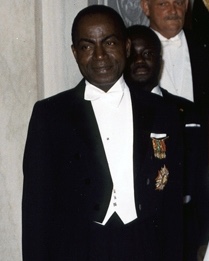African Agricultural Union
The African Agricultural Union (French: Syndicat agricole africain, SAA) was the first quasi-political party in Côte d'Ivoire, led by Félix Houphouët-Boigny throughout its existence. It was established on 3 September 1944 by Houphouët-Boigny and the colonial administration.
History
[edit]
The SAA was established on 3 September 1944 by Houphouët-Boigny and the colonial administration at an inaugural meeting in Abidjan.[1] Under his presidency, it brought together African farmers who were dissatisfied with their paychecks and worked to protect their interests against those of European settlers.[2][3] Anti-colonialist and anti-racist, the organisation demanded better working conditions, higher wages, and the abolition of unfree labour.[1] The union quickly received the support of nearly 20,000 plantation workers.[1] Its success irritated the colonists to the extent that they took legal action against Houphouët.[4] However, the SAA increased his popularity as the voice of the Africans.[3]
When elected to the assemblée constituante on 4 November 1945, Houphouët-Boigny worked to implement the wishes of the SAA. He proposed a bill to abolish forced labour, the single most unpopular feature of French rule,[3] on 1 March 1946 which the Assembly adopted in 1947.[5] On 9 April 1946,[6] Houphouët-Boigny, with the help of the Groupes d'études communistes d'Abidjan, recreated the SAA as the Democratic Party of Côte d'Ivoire (PDCI),[7] the first effective party in Côte d'Ivoire[8] and the Ivorian section of the African Democratic Rally.
Notes
[edit]- ^ a b c Ellenbogen, pp. 26–31.
- ^ "Félix Houphouët-Boigny". Encyclopædia Universalis (in French). Paris: Encyclopædia Universalis. 1975.
- ^ a b c Noble, Kenneth B. (1993-12-08). "Felix Houphouet-Boigny, Ivory Coast's Leader Since Freedom in 1960, Is Dead". The New York Times. Retrieved 2008-07-23.
- ^ "Spécial Houphouet". Fraternité Matin (in French). Archived from the original on 2008-05-09. Retrieved 2008-07-22.
- ^ "Biographies des députés de la IV République: Félix Houphouët-Boigny" (in French). National Assembly of France. Retrieved 2008-07-17.
- ^ Toubabou, p. 60.
- ^ Amin, Samir; Bernard Nantet (1999). "Côte-d'Ivoire". Encyclopædia Universalis (in French). Paris: Encyclopædia Universalis.
- ^ "Felix Houphouët-Boigny". Encyclopedia of World Biography. Thomson Gale. Retrieved 2008-07-25.
References
[edit]- Ellenbogen, Alice (2002). La succession d'Houphouët-Boigny: entre tribalisme et démocratie. Paris: Harmattan. ISBN 2-7475-2950-9. OCLC 62407712.
- Toubabou, Le (2005). Le millefeuille ivoirien: un héritage de contraintes. Paris: Harmattan. ISBN 2-7475-9357-6. OCLC 62895346.
